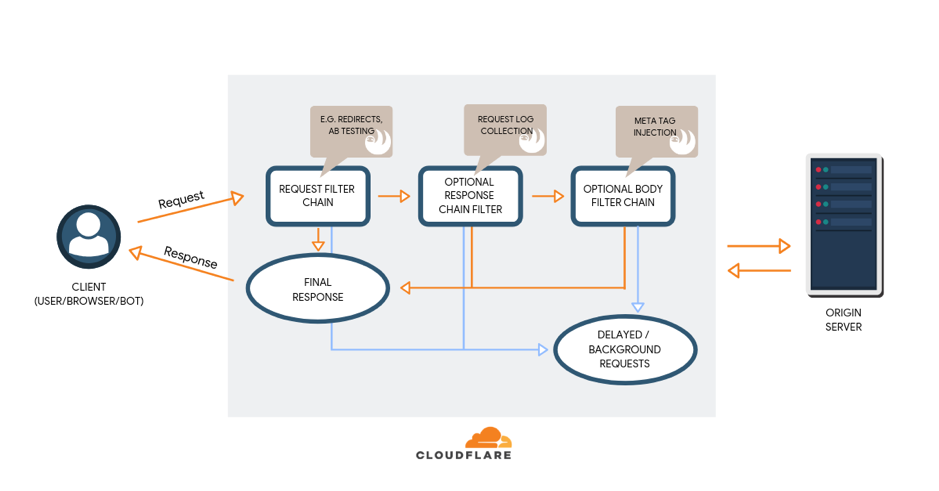Edge SEO is the concept of implement SEO fixes by deploying code either natively on a CDN, or through a modern delivery method such as Cloudflare Workers.
Whilst the concept of using CDNs for SEO isn’t new, I’ve been credited with coining the term edge SEO as I used it at my TechSEO Boost talk in 2018, when I presented our (SALT’s) research into how we can use Cloudflare Workers for SEO purposes, as well as how to make the technology more accessible.
Through Cloudflare Workers you are able to configure code (JavaScript) and deploy it “on the edge”, in this case Cloudflare’s CDN network, to modify either the request or response made by the client (user browser/Googlebot).

Some of the things you’re able to implement or do on the edge include:
- Hreflang tags (including across multiple websites and platforms)
- Reverse proxies
- Collect a form of logs for analysis
- Modify and inject meta data
- Implement redirects
Almost limitless potential
Cloudflare Workers can offer us a hail Mary solution to a number of issues we face as SEOs and marketers in getting our recommendations implemented.
A lot of enterprise level companies operate on very old, large tech stacks and infrastructures that simply can’t justify the business case to wholly reengineer or move to new stacks. These platforms often come with restrictions and limitations due to how they’ve been built and patched over the years.
Modern platforms are not free from issues either, whilst some are “more SEO friendly” out of the box than others, a lot don’t consult with SEOs directly or have poor knowledge in-house. An example of this being Salesforce recommending customers to work on increasing their Domain Authority.
I’ll go into further detail about common implementations, their major issues, and how Edge provides a solution in upcoming posts in this series.
Not an excuse to go rogue
It is important however to note that edge SEO should not be seen as a circumvention of DevOps and existing processes. Like any deployment push there are inherent risks and edge implementations should follow the same QA testing and deployment processes.
It’s designed for edge cases, were no other viable alternative exists – or the lead time to a more permanent resolution is too far away (and the business is suffering in terms of organic traffic, leads, and revenue).
Edge SEO isn’t for, or needed by, everyone. If you’re able to get around an issue using a plugin, or another method – great.
In order to use Cloudflare Workers, either natively or through a third-party edge SEO tool, you need two of three things, these being:
- Cloudflare Workers enabled within the account, which cost $5 per 10m requests (per month), and either:
- Access to the Cloudflare dashboard for your website
- Access to your Cloudflare authentication token
If someone within the business has the ability to go rogue and access any of the above and implement freely, then you have wider concerns around security – beyond whether or not edge SEO is right for you.
Future possibilities
Cloudflare is just the first CDN provider to allow code injection in such a way, bypassing the origin server and underlying codebase.
There are rumours that Fastly is also developing a solution, but in my opinion it is only a matter of time before other major CDNs including Imperva Incapsula, Akamai, and AWS potentially deliver similar solutions for customers.
Dan’s Taylor Edge SEO series
Part 1: Resolving SEO issues on legacy (and modern) platforms through edge SEO
Part 2: Creating & Managing Redirects on The Edge
Part 3: Integrating edge SEO into internal policies and workflows

